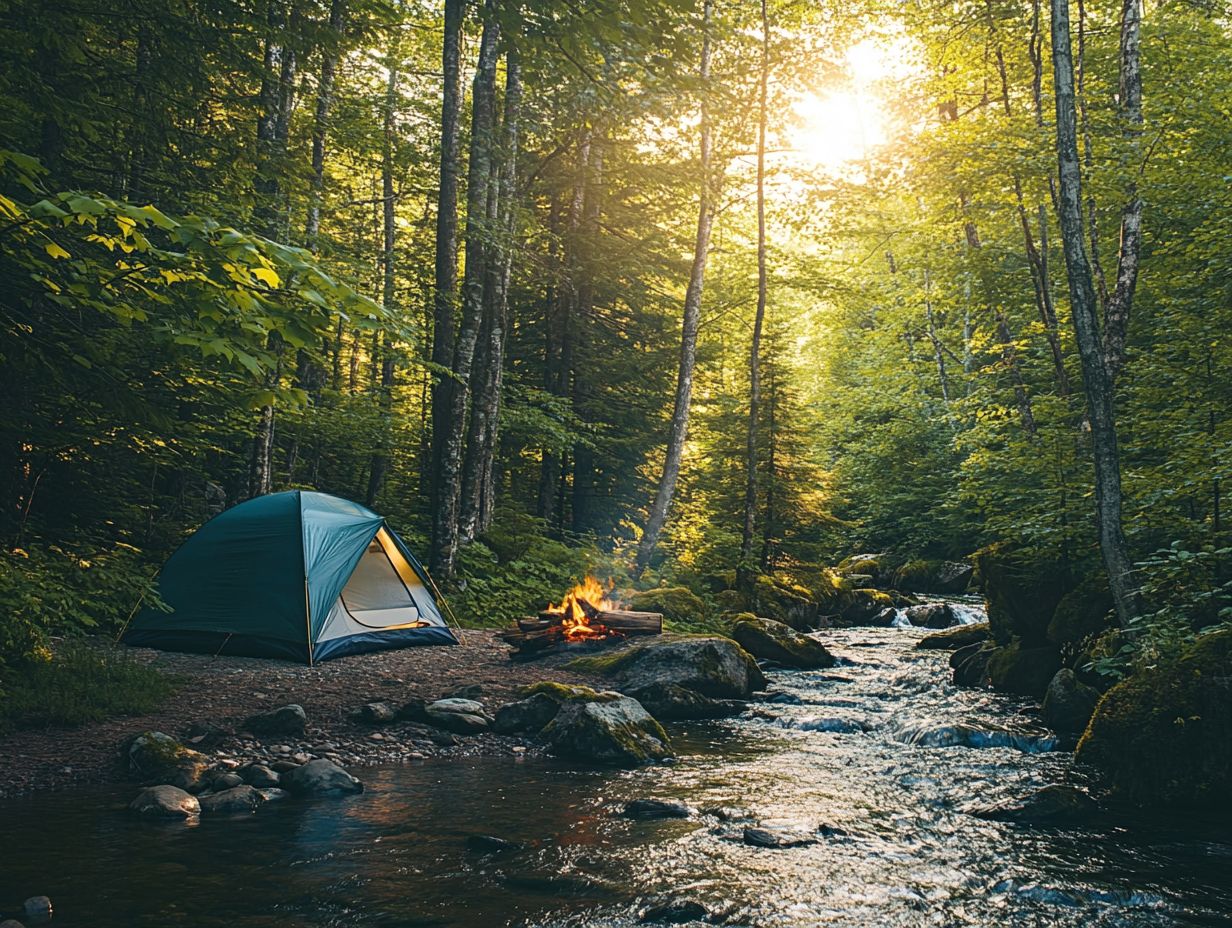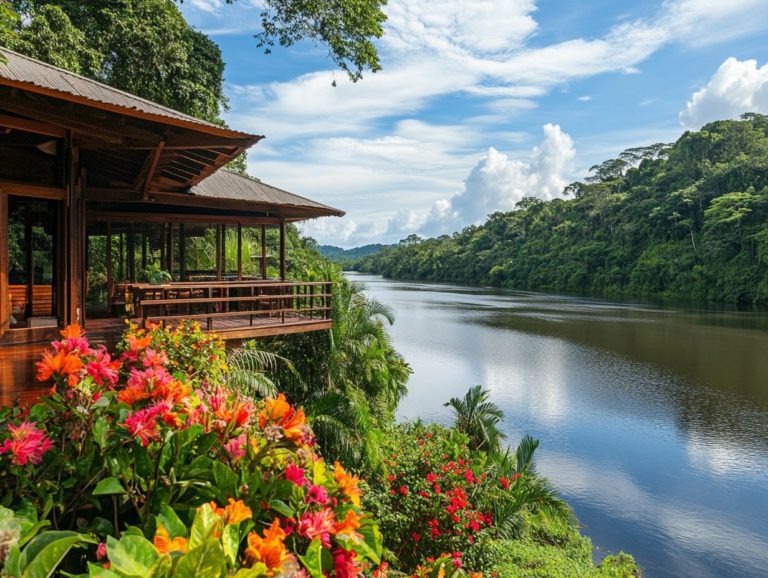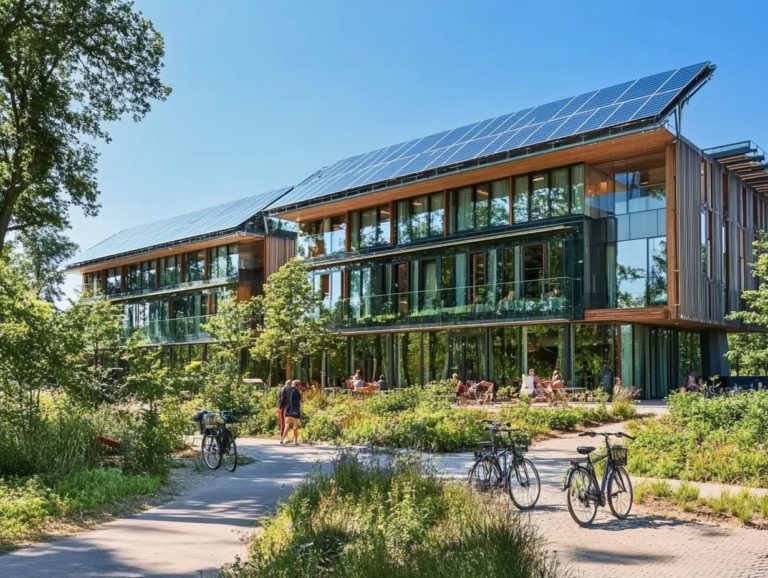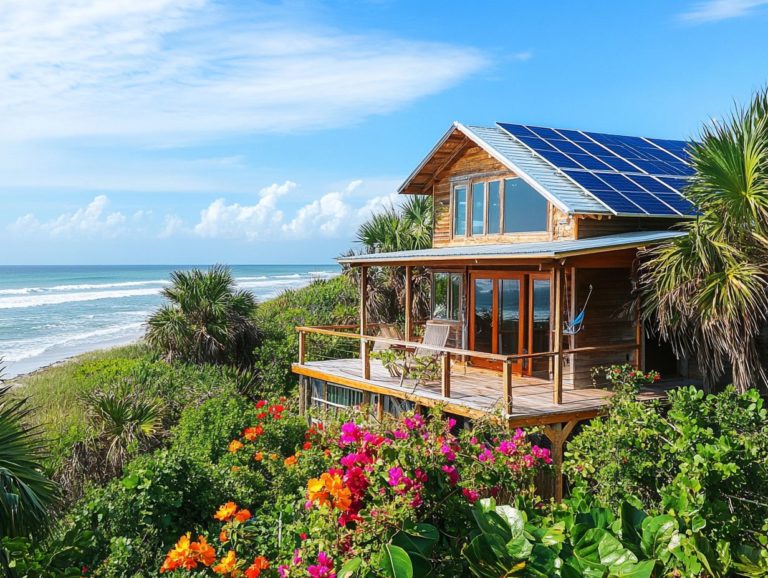Eco-Friendly Camping: Top Spots
Camping presents a remarkable opportunity to immerse yourself in nature, but it s crucial to do so while safeguarding the environment.
Get ready to discover essential tips for sustainable camping, encompassing everything from selecting eco-friendly gear to respecting local wildlife. You will uncover stunning eco-friendly camping destinations, such as Acadia National Park in Maine and Zion National Park in Utah.
Join us as we detail practical steps you can take to minimize your impact and engage with the great outdoors through nature activities in a responsible manner.
Contents
- Key Takeaways:
- 1. Explore the Great Outdoors Sustainably
- 2. Plan Ahead and Prepare
- 3. Choose Eco-Friendly Camping Gear
- 4. Leave No Trace
- 5. Respect the Wildlife
- 6. Use Renewable Energy Sources
- 7. Support Local Communities
- 8. Explore Alternative Transportation for Your Trip
- 9. Choose Sustainable Accommodations
- 10. Reduce, Reuse, Recycle
- 11. Participate in Eco-Friendly Activities
- 12. Educate Yourself and Others
- 13. Explore These Eco-Friendly Camping Spots
- 14. Acadia National Park, Maine
- 15. Zion National Park, Utah
- What Are Some Other Eco-Friendly Camping Spots?
- How Can Campers Minimize Their Environmental Impact?
- What Are Some Common Mistakes Campers Make When Trying to Be Eco-Friendly?
- What Are Some Eco-Friendly Activities to Do While Camping?
- How Can One Encourage Others to Camp Sustainably and Embrace Eco-Friendly Practices?
- Frequently Asked Questions
- What is eco-friendly camping?
- What are some benefits of eco-friendly camping and sustainable practices?
- Are there any top spots for eco-friendly camping?
- How can I ensure I am practicing eco-friendly camping?
- What are some eco-friendly camping gear options?
- Can I still have a comfortable camping experience while being eco-friendly?
Key Takeaways:

- Choose eco-friendly gear and accommodations to minimize your environmental impact while camping.
- Practice Leave No Trace principles, which help you minimize your impact on nature, to leave the campsite as you found it.
- Support local communities and participate in sustainable activities while exploring eco-friendly camping spots like Acadia National Park and Zion National Park.
1. Explore the Great Outdoors Sustainably
Exploring the great outdoors sustainably isn t just a choice; it s a commitment to preserving nature for future generations. As an environmentally aware camper, you can enjoy camping in ways that minimize your environmental impact while maximizing your connection with the breathtaking beauty of the natural world.
By embracing sustainable practices like eco camping, you actively engage in conservation efforts that protect biodiversity and promote responsible outdoor exploration.
One effective way to enhance this commitment is through proper waste management. Ensure that you dispose of all trash correctly or take it back home with you. Supporting eco-tourism initiatives helps local economies thrive and fosters a sense of stewardship for the environment.
Choosing camping sites that prioritize sustainability enriches your experience, as many facilities use solar power, composting toilets, and natural landscaping. Consider exploring eco-friendly glamping spots for a unique getaway.
When you make conscious choices such as utilizing reusable gear and adhering to Leave No Trace principles you contribute to a broader movement of responsible enjoyment of the great outdoors. This reinforces a culture that respects and nurtures nature, allowing you to enjoy your adventures with both purpose and pleasure.
2. Plan Ahead and Prepare
Planning ahead is critical start your journey with the right supplies to protect our beautiful landscapes for the future. Preparing for your camping trip not only enhances your enjoyment but also contributes to a more eco-friendly experience, allowing you to fully engage in nature activities like stargazing while keeping your carbon footprint in check.
Taking the time to research eco-friendly products—think biodegradable soaps and reusable camping gear—can significantly lessen your environmental impact. For an immersive experience, consider staying in one of the top eco-friendly cabins in the woods. Understanding local regulations related to responsible tourism, such as fire restrictions and wildlife protection laws, is essential for preserving the stunning beauty of natural spaces.
By creating an itinerary that prioritizes sustainable practices, like selecting trails that minimize ecosystem damage and supporting local businesses, you enrich not only your outdoor adventure but also the community you visit. This mindful approach fosters a deeper connection with nature, ensuring it remains protected for generations to come.
3. Choose Eco-Friendly Camping Gear
Choosing eco-friendly camping gear is crucial for minimizing the environmental impact of your outdoor adventures. It allows you to revel in the beauty of nature while ensuring that you re not causing any harm, all by utilizing products crafted from renewable energy and organic materials.
When you opt for tents made from recycled materials, you re not just reducing waste; you re also securing sturdy accommodations that can withstand whatever Mother Nature throws your way. Solar-powered gadgets, like lanterns and chargers, elevate your camping experience while quietly working to lower your carbon footprint.
Biodegradable utensils and toiletries ensure that even your most basic needs align seamlessly with your sustainability goals. These choices reflect a genuine commitment to preserving the environment, enabling you to explore with a clear conscience and a deep respect for the natural landscapes that serve as your playground while supporting local organic agriculture.
4. Leave No Trace
The Leave No Trace principles are essential guidelines for outdoor enthusiasts. They highlight the vital role of waste management and conservation in preserving nature’s beauty for future generations. These practices ensure that our wild places remain vibrant and healthy.
These principles encourage you to minimize your ecological footprint while enjoying the great outdoors. By promoting responsible behaviors like respecting wildlife, sticking to designated trails, and properly disposing of waste, you help foster a culture of environmental stewardship.
Implementing these practices not only enhances your outdoor experience but also protects natural resources. By embracing these principles, you create a deeper connection with nature and inspire others to do the same. This creates a ripple effect in your community, promoting sustainability and preserving pristine landscapes for everyone to enjoy.
5. Respect the Wildlife
Respecting wildlife while camping is crucial for maintaining healthy ecosystems and ensuring the safety of both animals and humans. This commitment resonates with people who care about the environment and prioritize conservation.
Keeping a respectful distance from wildlife helps minimize stress and disruption in their behavior. Remember, feeding wildlife can hurt them, so let’s not do it! Feeding them creates unhealthy dependencies on human-provided food, disrupting their natural foraging habits.
Understanding local natural environments allows you to appreciate the intricate relationships among species. Such mindful practices protect wildlife and deepen your commitment to preserving these natural habitats for future generations.
6. Use Renewable Energy Sources
Using renewable energy sources, like solar panels, during your camping trip can significantly reduce your carbon footprint. This allows you to enjoy a low-impact experience that aligns with eco-friendly practices and enhances your comfort.
Solar panels are excellent for charging devices such as phones, cameras, and portable batteries, keeping you connected without traditional power sources. Many campgrounds now offer eco-friendly accommodations that harness renewable energy, giving you modern comforts while promoting sustainability.
Using these technologies on your outdoor trips not only helps you enjoy nature but also protects it for future campers! To explore ways to hike responsibly, check out eco-friendly hiking: top trails for nature lovers. This harmonious blend of technology and nature allows you to appreciate the great outdoors with a clear conscience.
7. Support Local Communities

Supporting local communities during your camping adventures enhances your experience and contributes to economic growth through eco-tourism and responsible tourism practices. This ensures your trip leaves a positive mark on the area you explore.
By choosing to purchase local produce, you savor fresh, seasonal foods while benefiting farmers and artisans in the region. Participating in community events like craft fairs or cultural festivals allows you to forge meaningful connections and gain insight into local traditions.
Opting for eco-tourism initiatives means participating in activities that prioritize sustainability. Choosing eco-friendly stays near national parks fosters a sense of belonging and responsibility, turning each camping trip into an opportunity to support and uplift the communities that welcome you.
8. Explore Alternative Transportation for Your Trip
Exploring alternative transportation for your camping trip can greatly lower your travel’s impact on the environment and enhance your camping experience.
By carpooling with friends or fellow outdoor enthusiasts, you can reduce the number of vehicles on the road, cutting down on greenhouse gas emissions. Buses and trains are great options. They help you relax while being eco-friendly.
Biking to your campsite offers a refreshing and unique experience while also reducing your reliance on fossil fuels. Each of these choices enhances the joy of camping and helps protect our environment for future generations.
9. Choose Sustainable Accommodations
Choose sustainable accommodations to enjoy a camping experience that respects nature and supports conservation.
These options range from eco-ranches blending farming with conservation to glamping sites that provide luxury while being environmentally responsible. They inspire a deeper connection with your surroundings.
Lodges focused on sustainability often harness solar energy, use water conservation techniques, and employ locally sourced materials. All of these promote ecological awareness.
By choosing such retreats, you support businesses that prioritize the planet and join a movement that champions biodiversity. This experience cultivates a greater appreciation for nature, encouraging you to adopt environmentally friendly practices in your daily life.
10. Reduce, Reuse, Recycle
Implementing reduce, reuse, and recycle principles is crucial for effective waste management during your camping trip. This commitment showcases your dedication to eco-friendly products.
By packing reusable items like stainless steel water bottles and durable utensils, you can significantly cut down on single-use plastics and disposable products that typically end up in landfills.
Understanding proper recycling and composting methods such as sorting waste according to local guidelines ensures that recyclable materials are treated appropriately.
Each small effort you make, like choosing biodegradable soaps and opting for organic options, not only reduces your footprint but also fosters a deeper connection with nature. These practices inspire others to embrace sustainable habits. Ultimately, they lead to a more harmonious outdoor experience for everyone involved.
11. Participate in Eco-Friendly Activities
Participating in eco-friendly activities while camping enriches your experience and enhances your environmental awareness. It allows you to connect with nature in truly meaningful ways.
Engaging in pursuits like hiking along scenic trails and participating in nature activities invigorates your body while revealing the intricate beauty of local flora and fauna. As you wander through the wilderness, you ll discover details that often go unnoticed.
When night falls and you find yourself stargazing, you ll feel a profound sense of wonder, prompting you to contemplate the vastness of the universe and your place within it.
Wildlife observation offers a unique chance to witness nature s delicate balance firsthand, inspiring a deeper commitment to conservation.
Each of these activities fosters a richer understanding of ecological systems, nurturing a lasting respect for the environment that extends far beyond your camping adventure.
12. Educate Yourself and Others
Educating yourself and others about sustainable camping practices and Leave No Trace principles is essential for building an awareness-focused community where awareness thrives and future generations are inspired to prioritize conservation.
To truly immerse yourself in the local ecosystems, consider exploring the unique flora and fauna and local produce of the area through field guides or local workshops. Engaging with fellow outdoor enthusiasts can spark fresh ideas and foster a sense of community centered around shared values.
By sharing your knowledge of eco-friendly practices, like Leave No Trace principles guidelines that promote responsible recreation you can help create an atmosphere of responsibility and care for the outdoors. This collective effort not only enhances your camping experience but also enables you to become an advocate for sustainable practices, nurturing a culture that values and protects nature.
13. Explore These Eco-Friendly Camping Spots
Exploring eco-friendly camping spots opens the door to unique destinations that prioritize sustainable practices, allowing you to connect with nature while minimizing your environmental footprint.
These remarkable locations often feature solar-powered accommodations, composting toilets, and waste management systems, along with organic gardens that support organic agriculture. You may discover campsites tucked away in pristine national parks, where naturalist-led hikes not only immerse you in breathtaking landscapes but also engage you in conservation efforts and wildlife education. For those looking to explore, check out the top 10 eco-friendly travel spots for 2024.
Other sites might boast stunning beachfront views, fully committed to marine conservation, encouraging activities like snorkeling and beach clean-up initiatives along with other green initiatives. Whether you’re stargazing in remote mountain retreats or getting your hands dirty with tree-planting projects in lush forests, these environmentally friendly campgrounds resonate with travelers who are dedicated to living in harmony with nature. For those seeking thrilling experiences, check out the top eco-friendly destinations for adventure seekers.
14. Acadia National Park, Maine

Acadia National Park in Maine stands as a premier example of environmentally friendly travel, where you can revel in breathtaking landscapes while embracing responsible outdoor activities and conservation efforts.
As you explore the park, immerse yourself in the charm of local produce markets that showcase fresh, seasonal ingredients sourced from nearby farms, deepening your connection to the region’s agricultural heritage. Consider joining guided nature walks led by knowledgeable enthusiasts, where you ll learn about sustainable practices and the unique ecosystem’s significance.
The park is actively involved in initiatives designed to protect its diverse wildlife and flora, ensuring that future generations can also enjoy its unparalleled beauty.
These enriching experiences not only enhance your appreciation for nature but also inspire you to make sustainable choices that reduce your carbon footprint as you navigate this magnificent landscape.
15. Zion National Park, Utah
Zion National Park in Utah invites you to immerse yourself in a wealth of outdoor activities, all while fostering a sense of environmental stewardship and a genuine appreciation for the park s distinctive natural resources.
This park captivates not only with its breathtaking landscapes but also with its unwavering commitment to sustainable practices. You ll find waste management initiatives, like recycling and composting stations, designed to help minimize the environmental footprint of visitors like yourself.
As you hike along the well-maintained trails, you ll connect with nature while actively preserving the delicate ecosystems around you. Wildlife observation offers you a glimpse into the park’s rich biodiversity, deepening your respect for the incredible species that call this stunning area home.
By engaging in these eco-friendly pursuits, you play a vital role in the ongoing efforts to protect and sustain the unparalleled beauty of Zion.
What Are Some Other Eco-Friendly Camping Spots?
You ll find a treasure trove of hidden gems and eco-friendly camping spots focused on sustainability. These unique locations offer experiences for environmentally conscious travelers.
Many campsites utilize renewable energy like solar or wind power, keeping your footprint minimal. Enjoy delightful farm-to-table experiences that celebrate local produce and foster a bond with nature.
Imagine staying in yurts made from sustainable materials or treehouses high in the treetops. These accommodations offer a unique way to immerse yourself in the great outdoors.
Choosing these sites lets you enjoy breathtaking scenery while playing a vital role in preserving ecosystems. This makes your outdoor adventures not just fun, but truly rewarding.
How Can Campers Minimize Their Environmental Impact?
You can significantly reduce your environmental impact with effective waste management. Adopt low-impact camping strategies to promote green camping.
By using biodegradable soaps and sustainable gear, you lessen your ecological footprint. Designated cooking areas encourage environmental awareness and reduce pollution.
Embracing the Leave No Trace principles means you take back what you bring in. These practices foster respect for nature and enable a more sustainable outdoor experience.
What Are Some Common Mistakes Campers Make When Trying to Be Eco-Friendly?
Even well-meaning campers can make mistakes that harm the environment. Proper waste management is crucial; neglecting it can lead to littering and damage to natural habitats.
Using disposable products creates unnecessary waste and contributes to environmental degradation. Respecting wildlife is essential; disturbing them can have lasting effects on ecosystems.
To avoid these mistakes, follow these tips:
- Carry reusable items.
- Plan for waste disposal by bringing designated bags.
- Educate yourself about local wildlife to observe safely.
Making these small changes can significantly benefit the great outdoors and lead to a more responsible camping trip. For inspiration on where to explore, check out eco-friendly travel options, including the best natural parks to visit.
What Are Some Eco-Friendly Activities to Do While Camping?
Engaging in eco-friendly activities while camping enhances your experience and connects you with nature. These activities support conservation efforts and promote eco-tourism.
Guided nature walks allow you to explore the outdoors while learning about local flora and fauna. Stargazing offers stunning views of the cosmos and prompts reflection on light pollution.
Wildlife observation enables deeper appreciation for various species. Each of these activities enriches your camping adventure and fosters a sense of responsibility to protect our natural world.
How Can One Encourage Others to Camp Sustainably and Embrace Eco-Friendly Practices?
Encouraging others to embrace sustainable camping and green initiatives is about sharing knowledge, engaging in community efforts, and raising awareness about the environment to cultivate a culture of responsible tourism.
By leading by example, you can showcase eco-friendly practices while enjoying the beauty of the great outdoors. Organizing community clean-ups enhances the appearance of local campsites and fosters a sense of shared responsibility among participants, especially when you consider exploring the best eco-friendly hiking destinations.
When you share educational resources about sustainable camping such as opting for biodegradable products (products that break down naturally and do not harm the environment) and respecting wildlife, you empower your friends and family to make environmentally conscious choices. For those looking to explore the great outdoors sustainably, consider checking out eco-friendly travel: top spots in Scandinavia. These collective efforts create a more harmonious relationship with nature, leading to lasting memories and inspiring future generations to carry on the legacy of responsible camping.
Frequently Asked Questions

What is eco-friendly camping?
Eco-friendly camping means camping in a way that protects nature. It involves using eco-friendly products and practices while camping and leaving the campsite in its natural state after use.
What are some benefits of eco-friendly camping and sustainable practices?
Eco-friendly camping offers many benefits, such as reducing waste, preserving natural resources, and promoting a healthier camping experience. It allows for a more peaceful and relaxing time as campers are surrounded by nature.
Are there any top spots for eco-friendly camping?
Yes, many fantastic options exist for eco-friendly camping. Popular spots include national parks, state parks, and campgrounds certified as eco-friendly by organizations like Leave No Trace and Green Key Global. Unique destinations like Big Bend National Park and Treebones Resort also stand out.
How can I ensure I am practicing eco-friendly camping?
To practice eco-friendly camping, follow the principles of Leave No Trace. Dispose of waste properly, use biodegradable products, and respect wildlife and vegetation. Research eco-friendly campsites and choose environmentally-friendly camping gear.
What are some eco-friendly camping gear options?
There are many eco-friendly camping gear options, such as solar-powered chargers, reusable utensils, containers, and biodegradable toiletries. Consider tents made from sustainable materials for a more eco-friendly setup.
Can I still have a comfortable camping experience while being eco-friendly?
Absolutely! Eco-friendly camping does not mean sacrificing comfort. Many eco-friendly products, like solar-powered devices and biodegradable toiletries, can enhance your camping experience. Plus, being surrounded by nature can be relaxing and rejuvenating.






